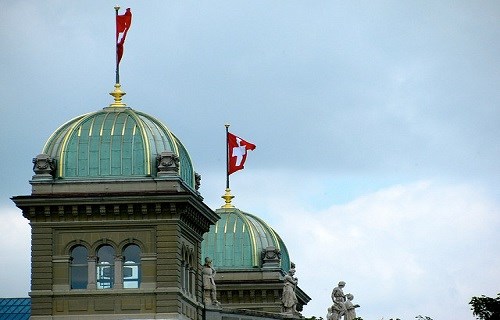Switzerland prepares stricter laws against sports corruption
The Swiss Parliament is currently debating changes to both the Unfair Competition Act and the Swiss Criminal Code, which would make corruption in international sports organisations a criminal offence that it is prosecuted by Swiss authorities.
Although this would constitute a major step in the fight against corruption in international sport, there still is a great deal of work to do with regard to preventing corruption in sports governing bodies.
Like multinational corporations operating on a global playing field, international sports organisations are free to choose the country with the most favourable law as the home for their operations.
Following the example of the International Olympic Committee (IOC), the majority of these organisations has their headquarters in Switzerland. While the presence of the IOC and other key sports organisations provides an important impetus for an international federation to have its home base in Switzerland, the country’s rather broad interpretation of the freedom of association is an even more important contributing factor.
In Switzerland, international sports organisations are registered as non-profit associations and, as such, fall under the relevant articles of the Swiss Civil Code, which provide (very basic) minimum requirements for associations. And most of these requirements are not even legally binding.
In addition, since they areconsidered to have a public utility, international sports organisations are exempt from tax at the Swiss federal level under the 2008 Host State Act. The Swiss law on sport, which entered into force in 2012, furthermore stipulates that the country “shall ensure, within the limits of its powers, that international sporting federations enjoy favourable conditions for their activities in Switzerland”.
Increased pressure on Switzerland
In the past years, high-profile corruption scandals, such as those in for instance FIFA, have increased pressure on Switzerland to hold senior officials in international sports organisations more to account.
On earlier occasions, sports organisations have averted stricter laws by threatening to relocate their headquarters to another country. For instance, in 1995, after the sports movement led by the IOC requested to be exempted from a new VAT law, but was rejected by the Federal Administration of Finance, the IOC and other organisations reacted sharply by threatening to relocate their offices to more flexible countries.
The pressure on Switzerland to make its rather flexible corporate legal framework more stringent is not entirely related to sport. For a long time, offering bribes was the usual way of doing business in the country – they were even deductible from corporate tax.
International pressure, for instance from the OECD with the Anti-Bribery Convention (2000), the Council of Europe via the Criminal Law Convention on Corruption (2006), and the United Nations through the Convention against Corruption (2009), all ratified by Switzerland, has done much to reverse that situation.
Private corruption can be criminal offence
While international pressure on Switzerland has increased over the last few years, the recent FIFA corruption scandals have accelerated efforts by the Swiss government to amend both the Unfair Competition Act and the Swiss Criminal Code in order to combat sports corruption more effectively.
In the light of the recent efforts by certain international sports organisations to boost their image (e.g. the FIFA governance reforms), it is unlikely that they will threaten with a relocation to another country as a result of these Swiss efforts to combat corruption. However, “since the amendments will have an effect on the private sector as a whole, and not only on international sports organisations, they are likely to have invoked some opposition from the Swiss private sector, which is very attached to self-regulation”, says Michael Mrkonjic, doctoral student at the Swiss Graduate School of Public Administration (IDHEAP).
According to Mrkonjic, the item was supposed to be treated during the summer session of the Parliamentary Assembly, but it has been postponed and it is unclear when it will resurface on the agenda.
The proposed amendments would change the legal state of affairs in two important ways. First, the proposed amendments will make private corruption a criminal offence, even if it does not lead to a distortion of competition. Under the current legal framework, corruption is only a criminal offence if it causes distortion of competition within the meaning of the Unfair Competition Act.
Second, private corruption will be prosecuted even if the injured party does not make a complaint. Today, private corruption is pursued only if an official complaint is lodged by the injured party.
So, what would be the consequences of these amendments for international sports organisations? If corrupt acts related for instance to the allocation of the hosting of big sporting events are discovered, the involved parties will be prosecuted by the Swiss state and they will face criminal charges. Altogether, the amendments constitute a major step in the fight against corruption in sport.
The Swiss hold the cards
However, repressive measures from the state are not enough to combat corruption in sport. The organisations themselves could take a more preventive approach. They still lack organisational structures that make sure that senior officials are held to account, such as having (financial) control mechanisms and basic transparency requirements in place.
That is why good governance in sport has become a major issue on the international sports political agenda and is now reflected in the work of several national governments around the world and in transnational institutions such as the Council of Europe, the EU and UNESCO.
And that is why Play the Game one month ago wrote a letter to the top administrators of all 35 Olympic sports federations, inviting them to cooperate in a benchmarking process where we will use our new tool, the Sports Governance Observer.
Much work thus remains to be done with regard to adopting a preventive approach to corruption in international sport, but the Swiss government holds the cards to take the next steps in this battle.
More information
See the AGGIS report
The Swiss Regulatory Framework and International Sports Organisations






